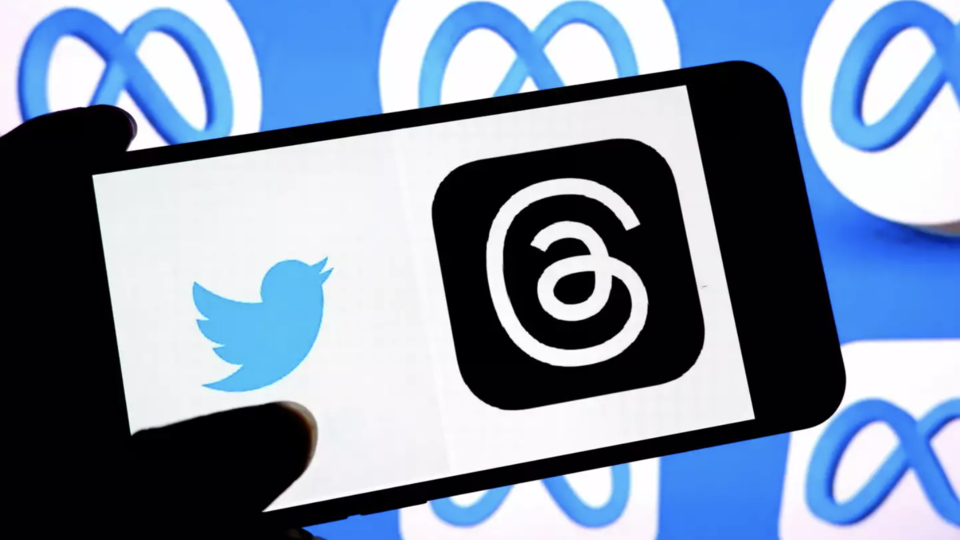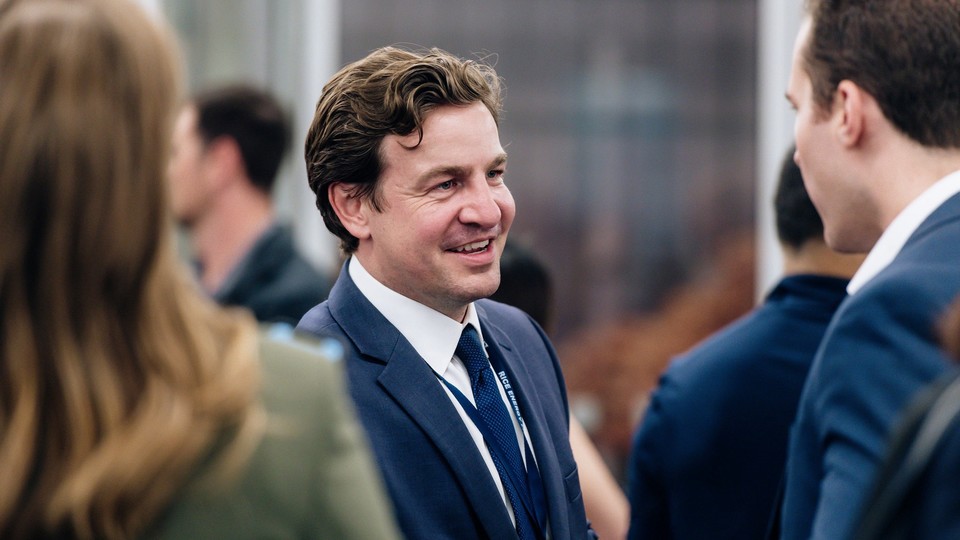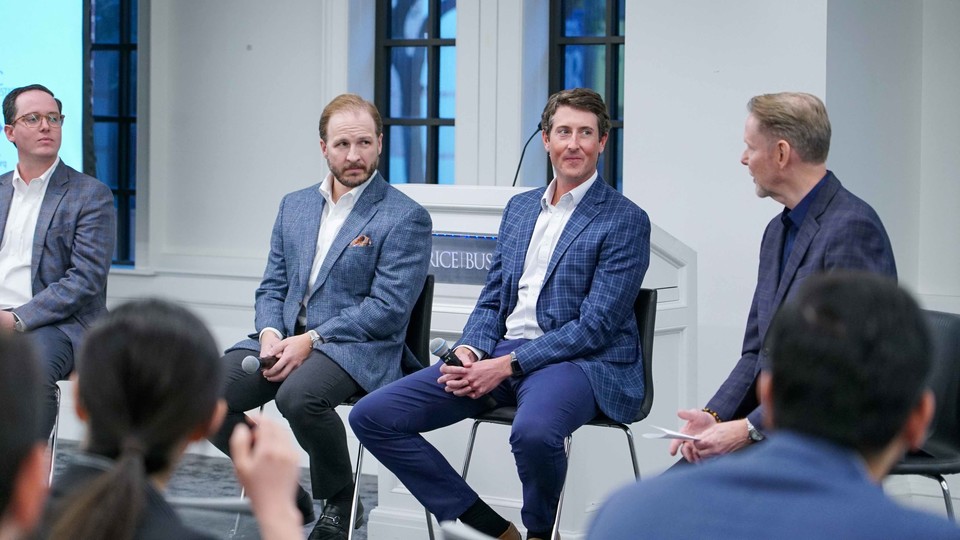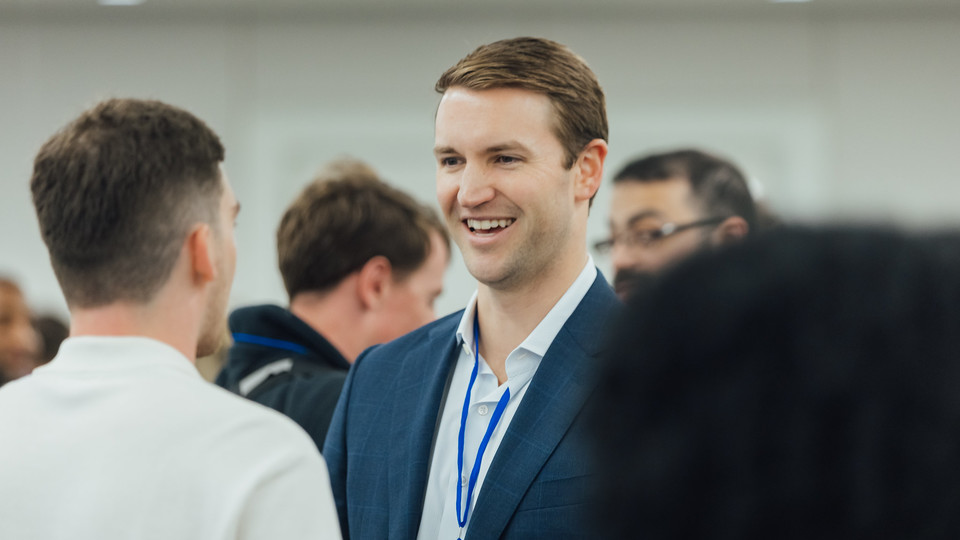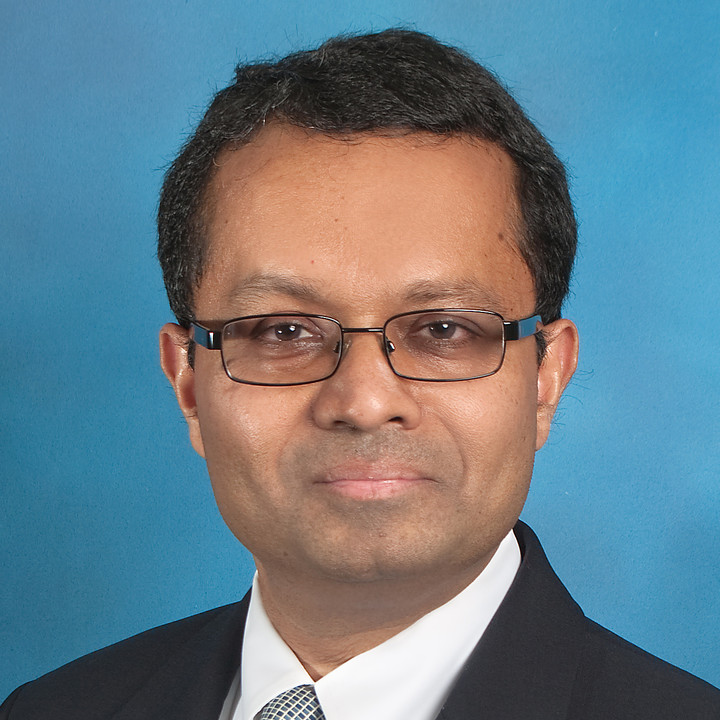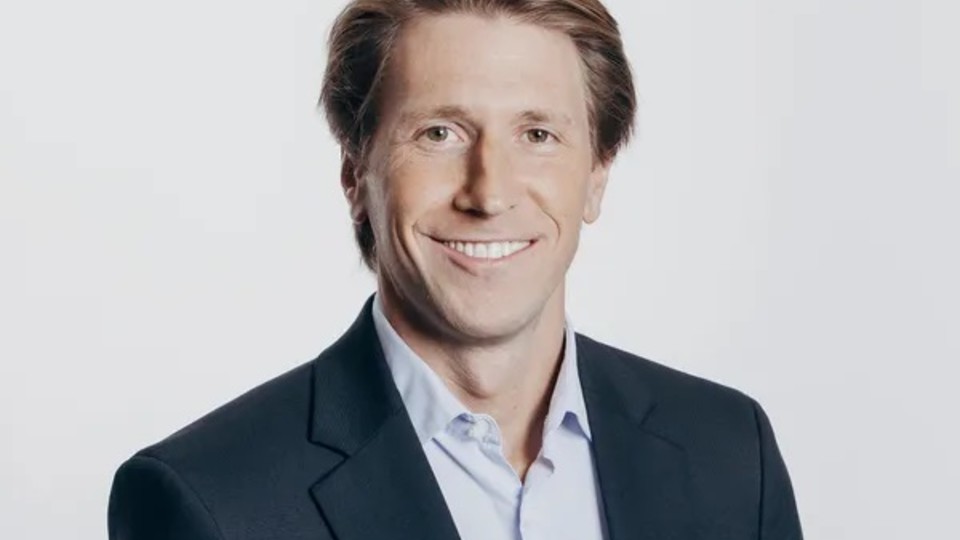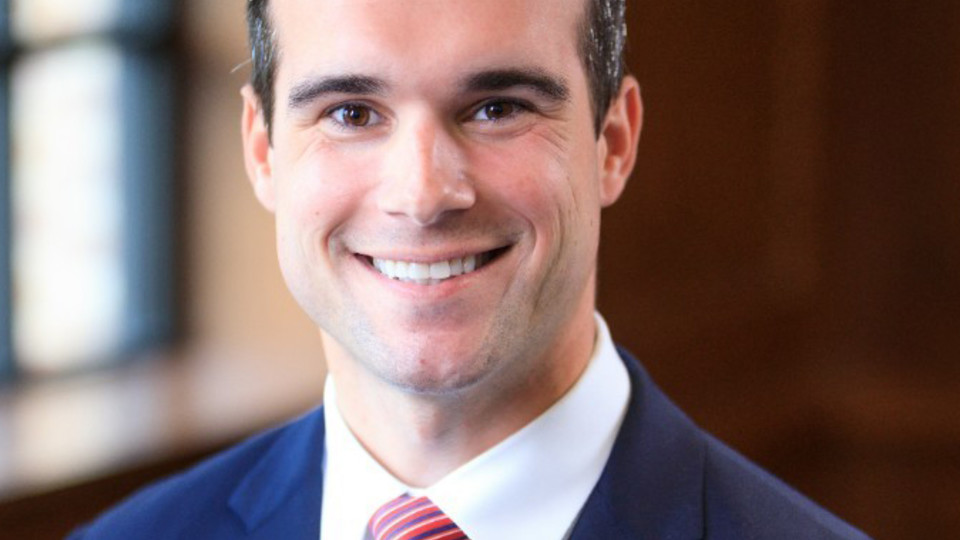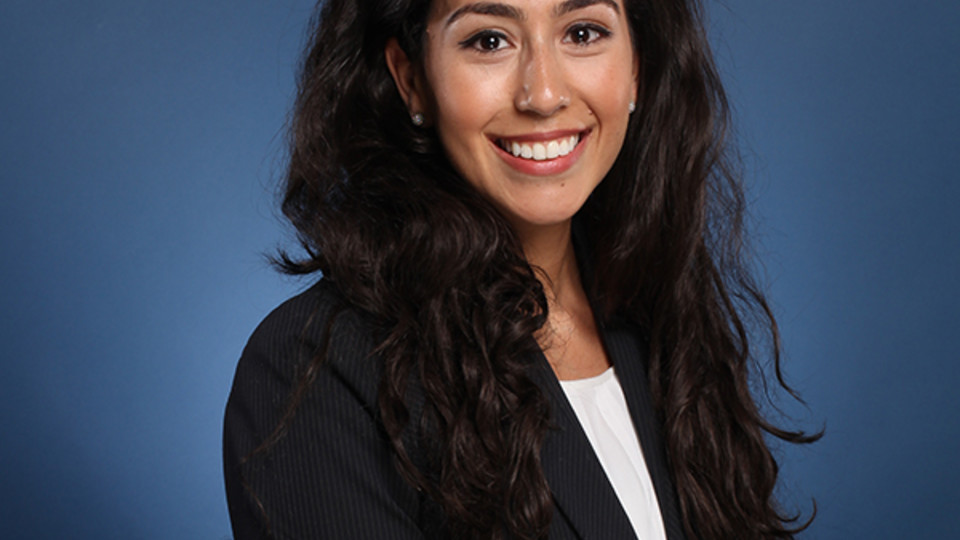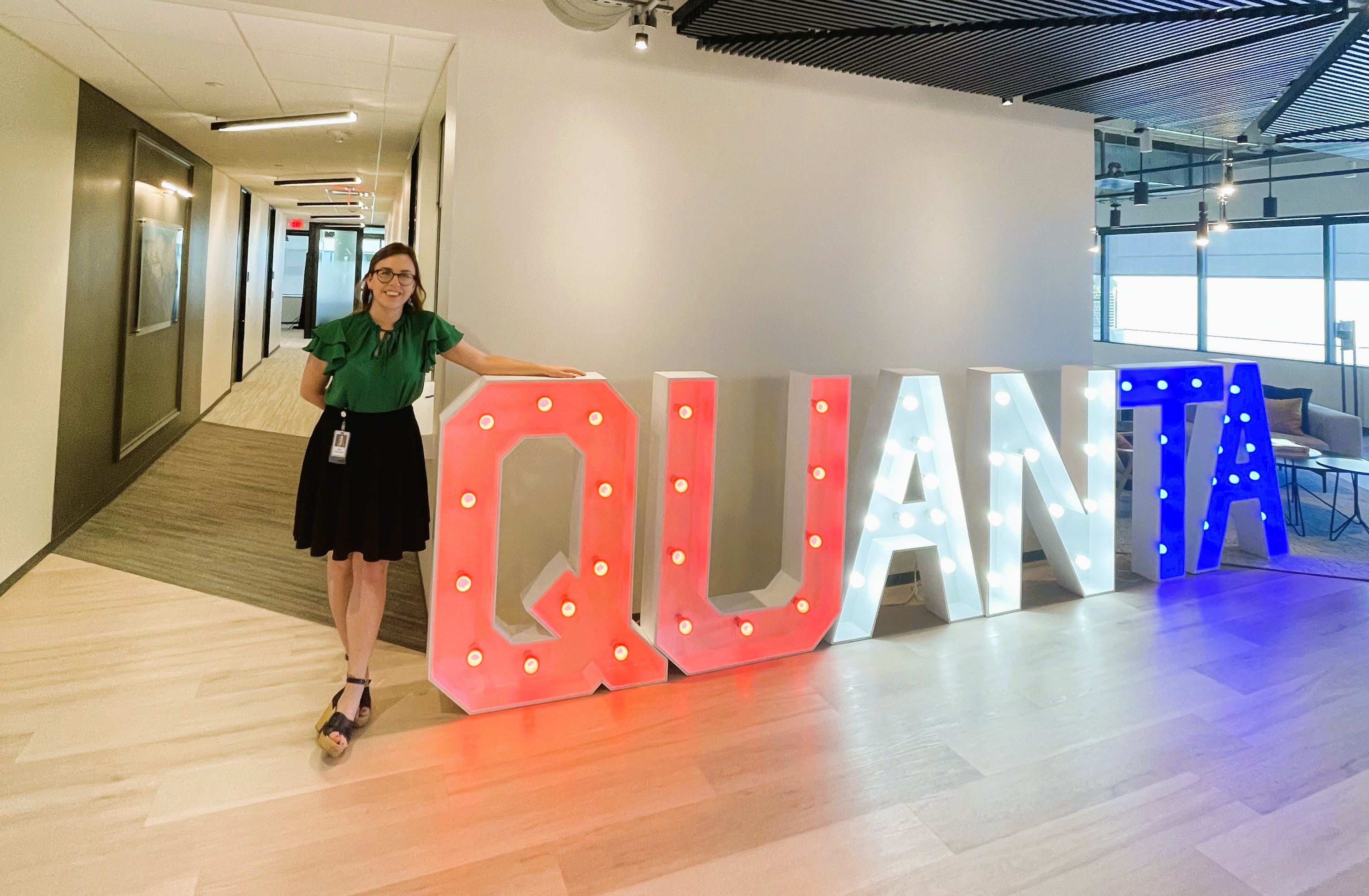
The Transformative Power of Summer Internships: Five MBA Students Share Insights
Summer internships offer MBA students vital real-world insights. We spoke with five students about their internship experiences.
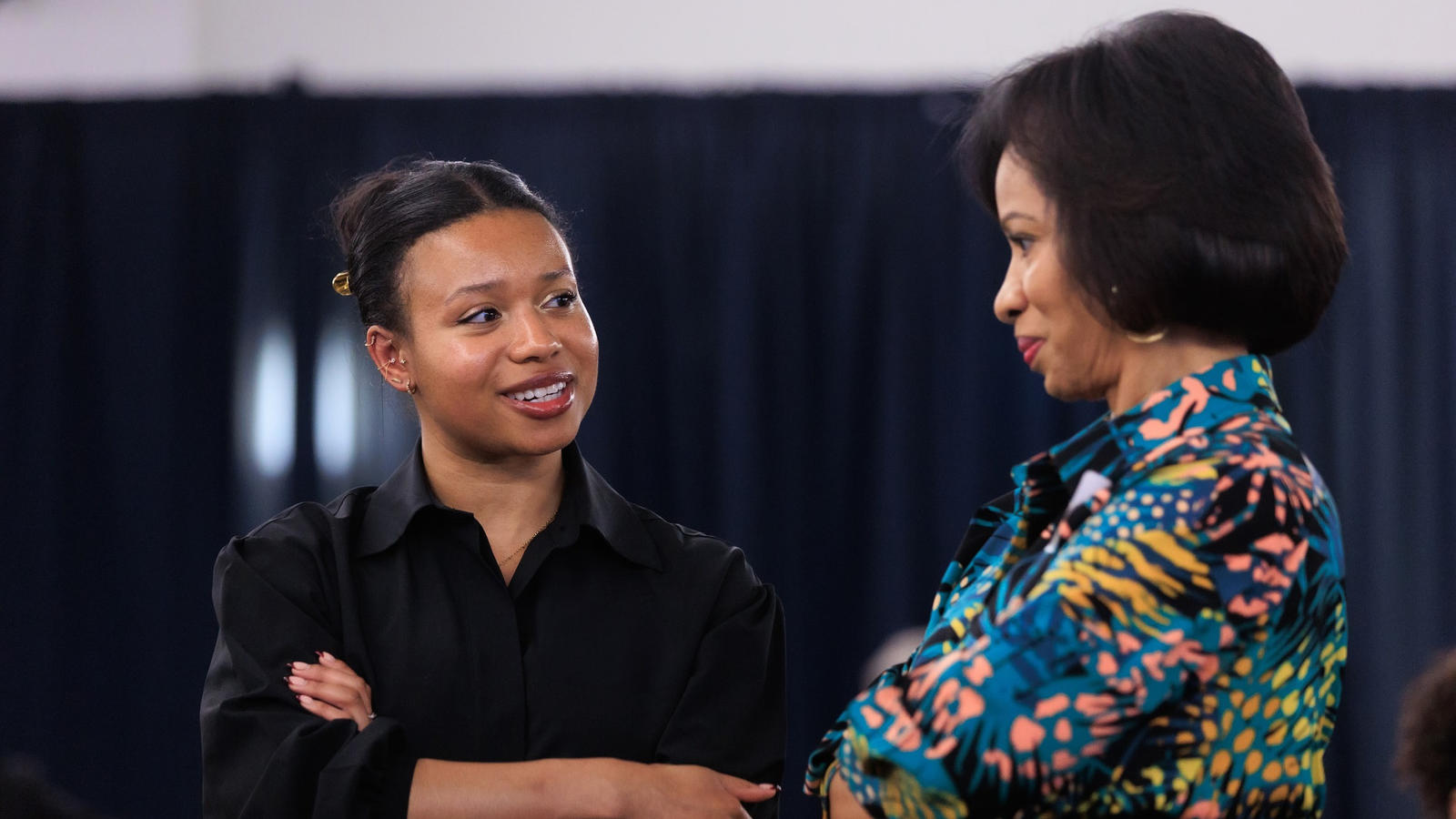
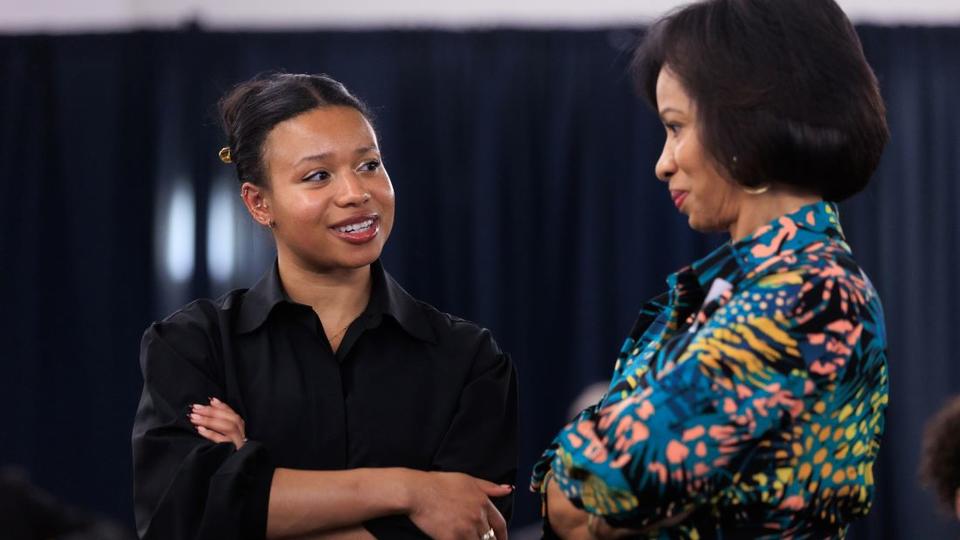
Summer internships are critical to a quality MBA experience. They offer vital insights and a chance to apply classroom knowledge to real-world scenarios.
We recently spoke with five MBA students to hear about their summer internship journeys. From strategizing sustainability at Cisco to innovating operations in the wine industry, these students describe how critical a summer internship is to achieving their career goals.

#1 — Driving Decarbonization at Quanta:
Nikki Beittenmiller’s internship journey began over breakfast with a former colleague. She has a passion for the energy transition, and Quanta Services — a corporation that provides infrastructure services for power and communication industries — was the perfect place to be. As an intern in the strategic operations department, she evaluates new market opportunities related to energy transition issues and technologies. Her Quanta internship will broaden her understanding of energy infrastructure and investments in climate tech.
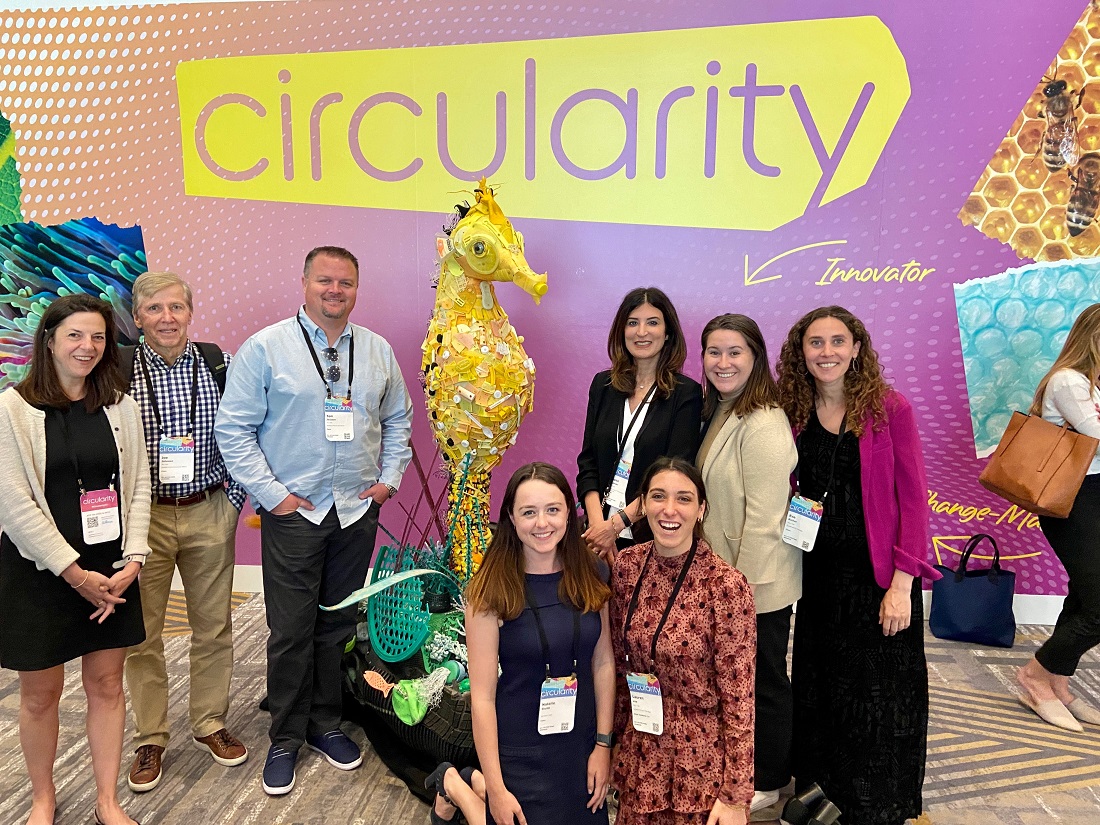
#2 — Sustainability Strategy at Cisco
For Dana Vazquez, being part of The Consortium helped her secure an internship with Cisco's sustainability strategy team. Through networking, Dana learned about Cisco's work and culture. Ultimately, she landed a role as Rising Leader in the company’s FLEX Intern Program. In this role, she explores the 3P space (people, policy and purpose) while managing and planning sustainability projects across various company sectors. On a big picture level, the internship has allowed her to explore the ESG field and find a niche in the energy industry.
Interested in Rice Business?
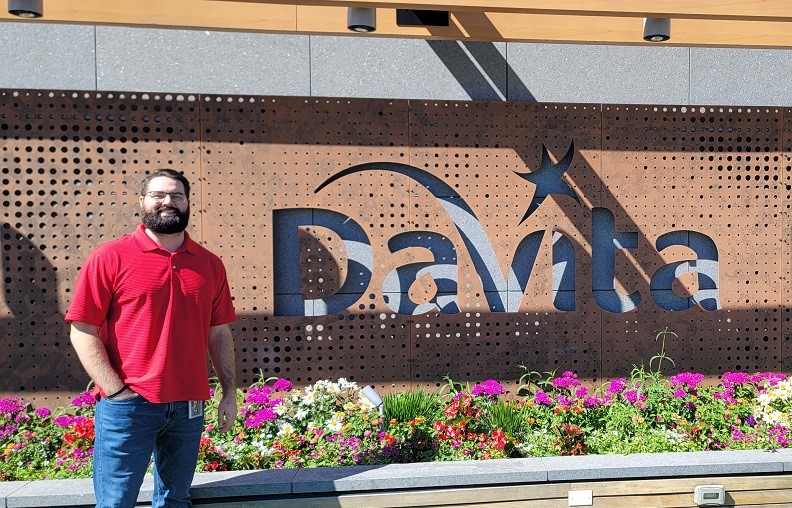
#3 — Healthcare Hustle at DaVita:
Ryan Flick’s internship in growth strategy at DaVita — a company that provides kidney dialysis services — is advancing his career in the healthcare industry. During his time there, he worked for a part of the company that generates $2 billion in annual top line revenue, developed best practices for division vice presidents, and presented strategy recommendations to senior executives. In his words, “My internship has made me a better leader and helped me contribute to driving positive change in the industry.”
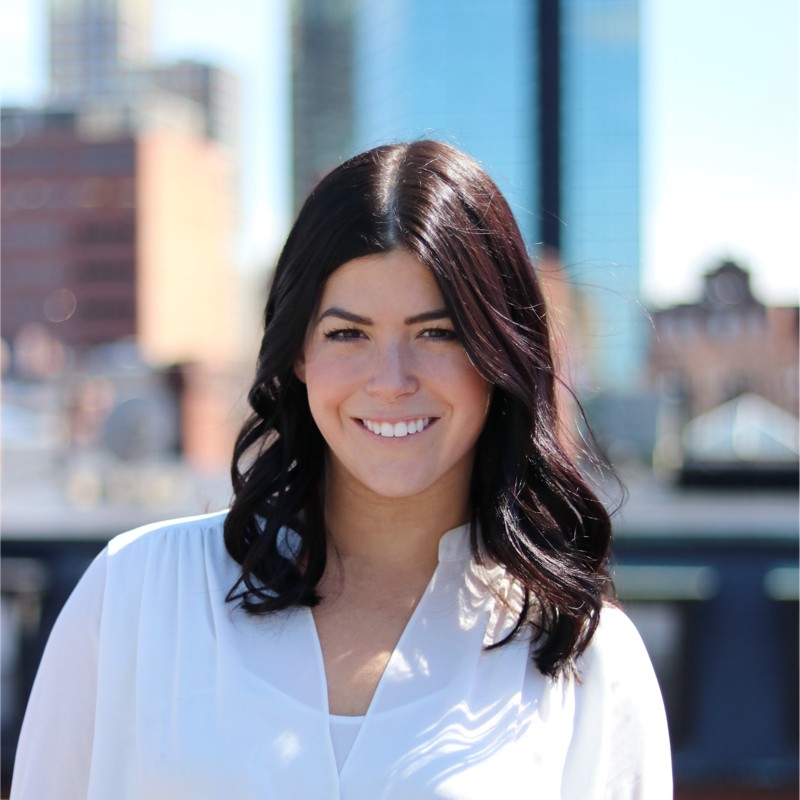
#4 — Furry Fun at Chewy:
Alex Post is interning at Chewy, an e-commerce company focused on pet products. She secured her internship by applying directly through the Chewy website and worked there as a merchandising consultant. Her post-MBA plan is to work for a CPG company like Chewy — one of the fastest growing CPGs in 2022 — so her internship aligns perfectly with her career goals. By happy accident, being at Chewy means being surrounded by new furry friends!
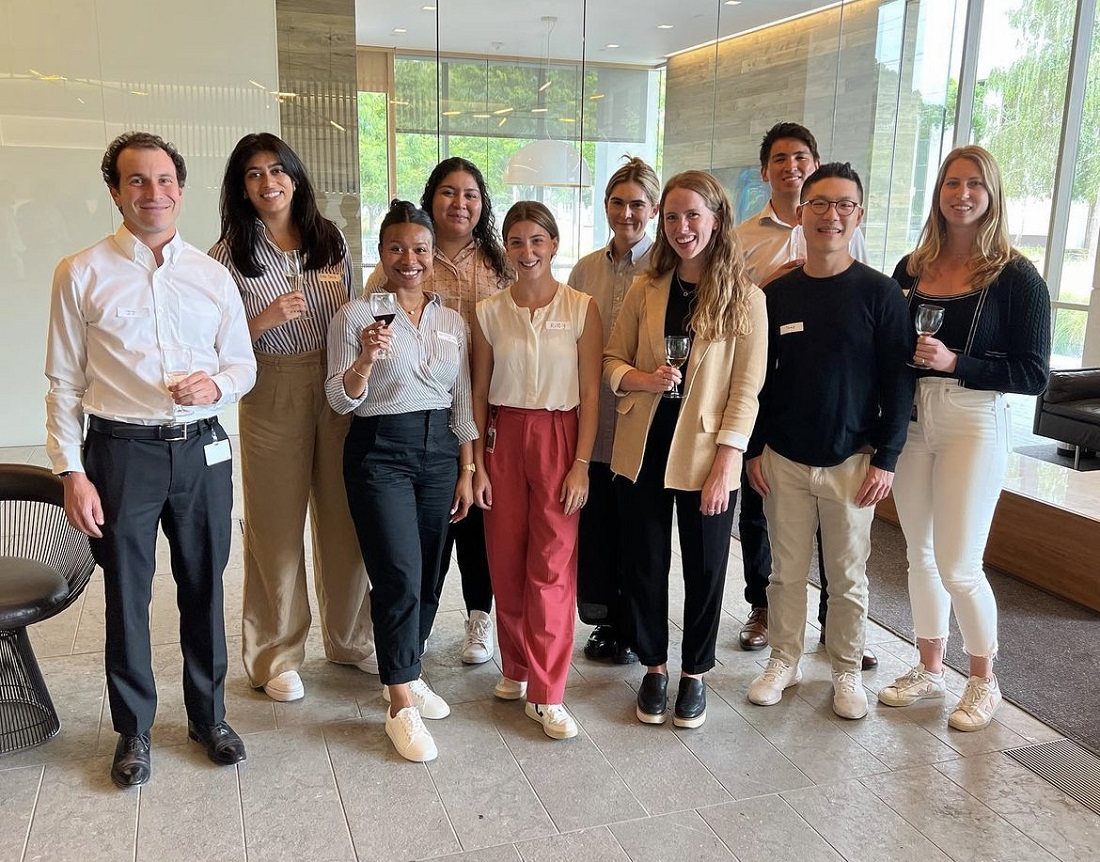
#5 — Vineyard Visionary at Gallo:
For Adrienne Miller, securing an internship with E. & J. Gallo, the largest winery in the world, was a dream come true. Working in their supply chain and operations department, she creates strategies to transform and innovate fiber materials to generate cost savings and minimize waste in packaging. The internship will help her pivot to become an innovator of luxury goods. Her favorite part of being at Gallo? A trip to Napa Valley, where she delved into viticulture and gained a deeper knowledge of wine and spirits.
As these five MBA students show, summer internships are critical to broadening one’s career horizons and staying true to one's passions. We’re excited to see where they go from here.
You May Also Like
Keep Exploring
2023 Best & Brightest Executive MBA: Lara Adesokan
"I wanted to enroll in a program that would make it conducive for me to juggle being a devoted mother of three children, a demanding career, and school. Rice was the perfect choice for me as it meant I didn’t have to travel far away from my family to attend classes."
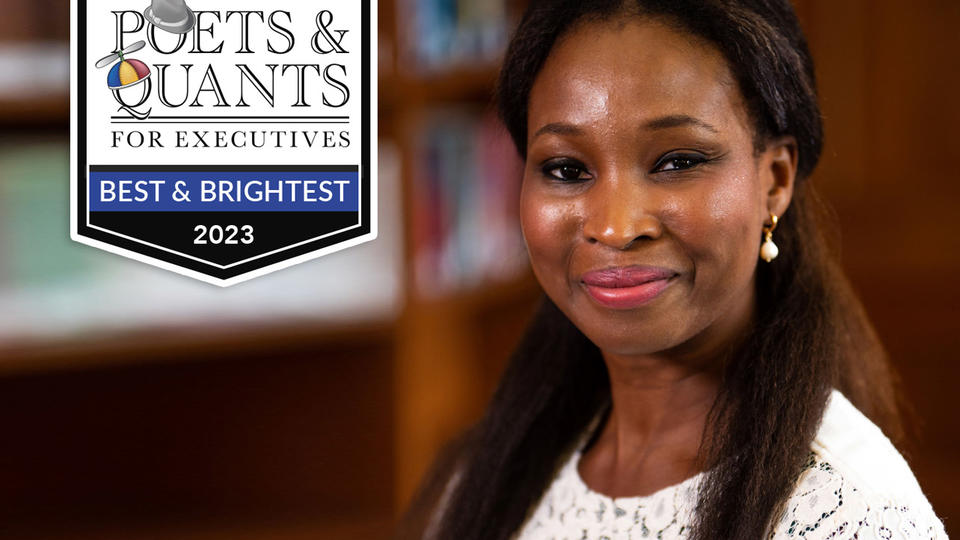
2023 Best & Brightest Executive MBA: Kevin Doffing
"As an introvert who plays an extrovert in my career, I need all the tools and mentors I can find. I’m leaving the program with more confidence and conviction of where I’m going and what I’m capable of, along with the benefit of access to an amazing network at Rice."
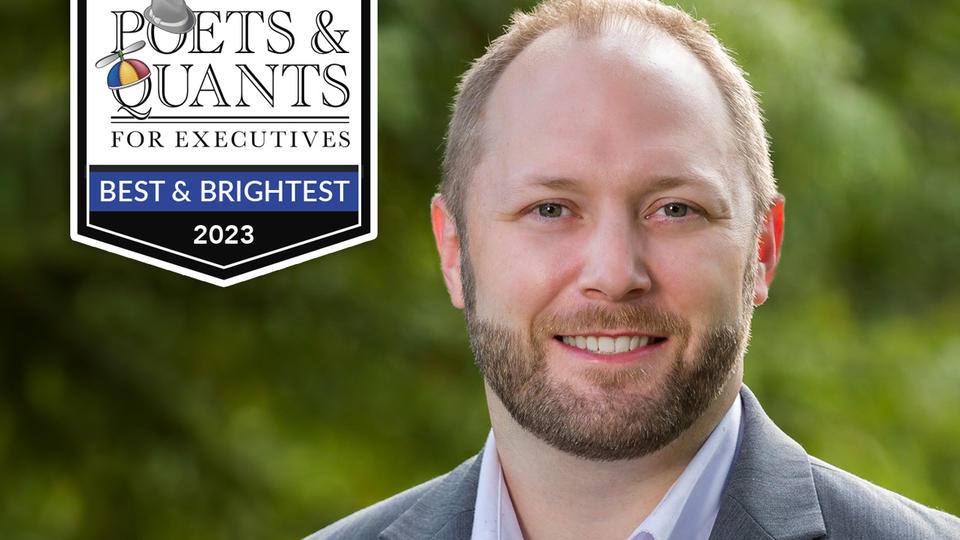
I See The Benefits of my MBA in Everything I Do feat. Tracy and John Dennis, FTMBA ’00 and ’93
Season 3, Episode 22
Tracy and John join host Maya Pomroy ’22 to talk about their lives together, what brought them to Houston and to Rice, post-Partio Lamaze classes, and why they continue to give back to the Rice community.
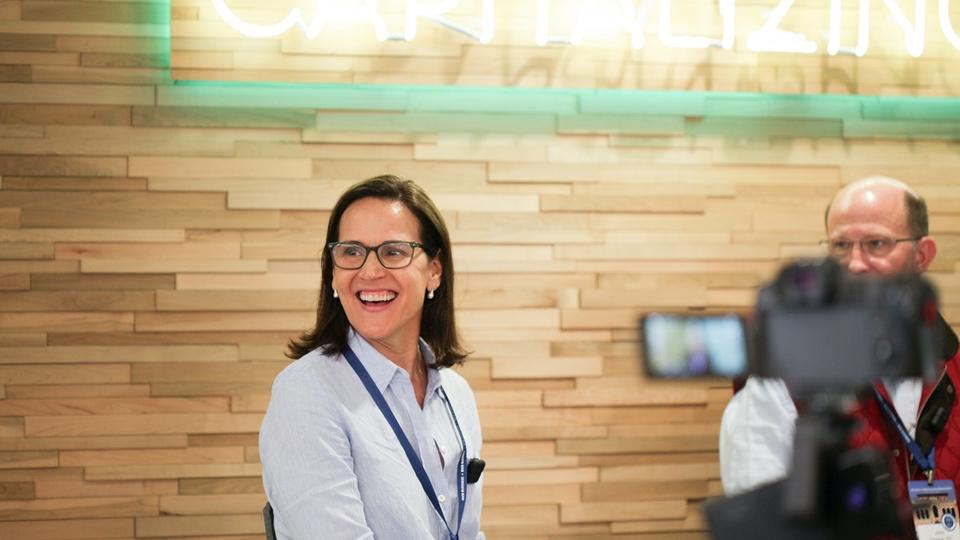
Owl Have You Know
Season 3, Episode 22
Tune into another recording from this year’s alumni reunion!
Tracy and John join host Maya Pomroy ’22 to talk about their lives together, what brought them to Houston and to Rice, post-Partio Lamaze classes, and why they continue to give back to the Rice community.
Watch
Listen
Subscribe to Owl Have You Know on Apple Podcasts, Spotify, Youtube or wherever you find your favorite podcasts.
Episode Transcript
-
[00:00] Intro: Welcome to Owl Have You Know, a podcast from Rice Business. This episode is part of our Flight Path series, where guests share their career journeys and stories of the Rice connections that got them where they are.
[00:12] Maya: Welcome, everyone, to Reunion Weekend here at Rice University. It's a fantastic weekend, so much energy and joy and excitement, and everyone is reconnecting, and some, some classes are meeting for the first time. And I just wanted to welcome both of you, Tracy and John Dennis, here with us today. Thank you for being here.
We, we snuck you away for a little bit of Reunion Weekend because we figured this is the best time to, to snag our alumni and, and reconnect and, and talk about what you've been up to since you were owls here at Rice. So, thank you for being here today. You are both not only Harvard graduates but also Rice University MBA graduates, which is, which is fairly unique. How did you, two, meet?
[00:58] John: We met at freshman week at Harvard. We were same class at Harvard.
[01:02] Maya: Really? In what class was it?
[01:04] John: 1986.
[01:06] Maya: But which specific class were you in?
[01:09] John: No, freshman week. That's-
[01:10] Maya: Oh, the worst.
[01:10] John: ... the first week of freshman year when you don't have classes and you're just drinking and chasing each other.
[01:15] Maya: That's perfect. So, so, you met in Harvard and then, you know, you had very different backgrounds. So, tell me what, what you studied at Harvard and, and what led you to business school.
[01:26] Tracy: I was a Russian and Soviet Studies major at Harvard. I went to undergrad thinking I was going to be a business major, but I never even checked to see if Harvard had an undergraduate business major. And it did not.
[01:39] Maya: It did not.
[01:39] Tracy: So, I started off at Economics, and I got into Economics, and I wasn't really loving it. And there was just, sort of, this impression among the, the freshmen that you had to go to graduate school. Like, everybody was planning to go to graduate school. And so, I thought, "Oh, perfect. I'll study something I'm truly passionate about and then I'll eventually go to business school."
And, you know, it took me a few years to get to business school after I graduated. And I had a, a short career as a bond trader, but had always wanted to go to business school to, kind of, connect a bunch of dots. You know, there were a lot of things that I, I, that I was exposed to that I wanted to learn more about but just never had the time to do. And so, business school, for me, was the opportunity to do that.
[02:29] Maya: So, let's back up to Russian and Soviet Studies. What, what interested you about that?
[02:34] Tracy: Russian family. I had a Russian grandmother, and she was actually never lived in Russia, but she was born in Manchuria and married an American naval officer who brought her to the States. But her brother, my uncle Nikolai, immigrated to the Soviet Union, and he used to come visit and they would speak Russian and I thought it was the most beautiful language and I wanted to learn to speak the language.
[03:02] Maya: That's interesting. So, I have a Russian grandmother as well.
[03:04] Tracy: Do you, really?
[03:04] Maya: I'm actually Russian. So, yes. That's why I was asking because what are, what are the odds, what are the odds of that? So, so, that's why. It was a familial reason-
[03:11] Tracy: Yes.
[03:12] Maya: ... that, that you wanted to study that.
[03:13] Tracy: Yeah, it was a great major, right? I mean, it was history, government, literature, and language. So, it was just, sort of, a wonderful major.
[03:20] Maya: And a naval officer connection as well, because you were in the Navy?
[03:24] John: Yeah, I was in the Navy after college, but I had applied to the Naval Academy and thought about ROTC programs. So, when my junior/senior year when the idea came back, I was fortunate to be dating someone for whom it was not a terrifying thought.
[03:39] Maya: So, tell me about your journey at Harvard.
[03:42] John: I, I, I, I would tell you I was an, an academic wanderer at Harvard unlike all my roommates who had very clear ideas of what they wanted to do from before they arrived. I was just happy to get out of high school and get into a college.
So, I, I got through Harvard, had some great summer jobs, and one of those, my, my summer job before my senior year, was with an investment bank in New York. And a whole bunch of the senior partners had all been military officers, and that's where the, the idea of being a naval officer came back to me.
[04:18] Maya: That's fascinating. And so, and so, you did investment banking but then you wanted to pivot?
[04:24] John: Yeah, so, I, I, I went to the Navy after college and when I came back from service, I went into investment banking, but into corporate finance, so slightly different from sales and trading, and had the opportunity to come back to Houston where Tracy had already relocated to Houston with her company out of New York.
And Houston, while I enjoyed growing up here, I never thought I would come back, but I think seeing, seeing Houston through Tracy's eyes gave me the opportunity to, kind of, look at it with an open mind, and it's been very, very good to us.
[04:59] Maya: And so, you started at Rice Business, and so you graduated in 1993.
[05:02] John: Right.
[05:03] Maya: And you graduated in the class of 2000.
[05:05] Tracy: That's right.
[05:05] Maya: And you were saying that you put him through business school. So, tell me about that.
[05:10] Tracy: I mean, I was working, and he decided to go back to business school, and so I just worked. And business school cost a whole lot less back then, so it was a little bit more manageable.
[05:22] John: Yeah.
[05:22] Tracy: I mean, I had always thought that I would go to business school, but I had a boss who said, "You don't need it for what you do. I'm not going to pay you any more money, you know, if you get it, if you get your MBA." And that's when you say, "I need a new boss."
[05:41] Maya: That's...
[05:41] Tracy: Exactly, and exactly. And so, I worked while he was in business school. But I, you know, I came to partios and I, you know, fed his team when they would come over to work on projects. And so, I, I swam with one of his classmates. I would write the workouts. I was a swimmer-
[06:04] John: Come swim here in Rice.
[06:05] Tracy: ... and we swam at the old pool together. So, I'd pick her up after class and we'd swim laps. And so, I very much felt like I was part of having an experience with them as well. And so, I, you know, I waited a few years, waited until we had a couple of little kids just to-
[06:23] Maya: It's the perfect...
[06:23] Tracy: ... dial it up a little bit. Yeah. And then, you know, and then we, sort of, switched roles.
[06:28] John: Tracy, Tracy became pregnant in my second year of business school. And in the spring, our first daughter was born in June. Tracy would come and pick me up at the partio, and...
[06:40] Maya: Wait, she let you go to the partio while you were at home with the baby?
[06:43] John: No, no, no, the baby wasn't here yet.
[06:44] Tracy: Oh, no. I picked him up of that since...
[06:45] John: So, this, this is, like, April and May.
[06:47] Maya: Oh, good.
[06:47] John: We're going to Lamas' classes-
[06:48] Maya: Oh.
[06:48] John: ... and Tracy would come pick me up at the partio, literally drive up on the curb and say, "Come on, it's time for you to get in the car." And we'd go to, we'd go to Lamas' classes. And, and by that point, I'd had, I don't know, three or four beers or maybe more.
And we would get to Lamas' class and the first thing that they would do is, sort of, want everyone to do these deep breathing exercises. And Tracy would be wide awake, and I was apparently falling asleep in the Lamas' class. So, I distinguished myself with some...
[07:17] Maya: What grade did you get in that class?
[07:18] John: I didn't do very well, I didn't do very well, didn't do very well.
[07:21] Maya: And so, so, after Rice, you started your own company.
[07:25] John: About later, but there were a series of, sort of, entrepreneurial steps in the way.
[07:31] Maya: Well, tell me about those steps.
[07:32] John: Immediately out of business school, I went to work for a, a private family here in Houston that was trying to buy Continental Airlines out of bankruptcy. And...
[07:42] Tracy: And it wasn't United.
[07:43] John: Well, it turned into United later, but it was Continental still at the time. And they ended up not being able to do the deal themselves, but they did it with a partner. That led to another airline acquisition that they did called America West. And then they also backed a, a purchase of a spare parts inventory from the Eastern Air Lines bankruptcy.
So, I spent a couple of years in airline aerospace-related deals, and then that same group of folks decided to back an oil field service company, and I had the opportunity to go work in that. And so, that was a business that we grew and built, and, and, and that was probably the most entrepreneurial opportunity I had in an operating company. So, that was good.
[08:27] Maya: That's good. And so, you had actually, Tracy, been... you just served as the president of the Alumni Board Association. You've, you've been a part of, of the Alumni Board for quite some time. So, tell me why you chose to continue to give back to Rice. Like, what, what is it that, that makes you want to still remain such an integral part of this university?
[08:49] Tracy: I just mentioned this in the other room. I, I see the benefits of my MBA in everything that I do. Every single day, I see it. I see it at work, I see it at home, I see it with our daughters who are in their early careers, you know. You know, I feel like I have benefited immensely from my MBA.
And, you know, I'm grateful. I really want to give back because of it. And also, I want to just continue to be a part of it just because it played such a big role in my life. And it's an exciting place to be right now. There's lots of great things going on. I'm, I'm teaching an ILE. I've taught it for two years now.
[09:37] Maya: Explain what an ILE.
[09:39] Tracy: An ILE is an intensive learning experience, and it is a intensive three-day course. That is three quarters of a credit. And I teach the courses called Principles of Survey Design. I've been a researcher ever since I graduated. That was a pivot for me after business school. When Barb asked me to teach this class, I thought, "I don't have three days’ worth of material. I think it's 18 hours’ worth of material."
But when I sat down and I thought, "You know, what would I share with people on this topic?" realized I had a lot to say on it. And so, it's very much an experiential. You know, the first day's a little bit of lecturing, but this 10-hour Saturday is just roll up your sleeves and do the work. And it's so much fun and so rewarding just to see people connecting those dots and the light bulbs going off.
And I, I put them in teams, and I give them an opportunity to choose a project. And a lot of them are working on something for their new enterprise class or working on something outside of school for their companies, if they're professionals or EMBAs, or for nonprofits that they're working on. And so, to really see that all come together for them is just so rewarding.
[10:53] Maya: I was telling my own daughter about survey design and how that works, and she was fascinated. So, I don't know. I mean, maybe in a couple years, you think she might be in that ILE class. So, so, how many daughters do you have?
[11:05] Tracy: Two.
[11:05] John: Two daughters.
[11:06] Maya: As do I. Girls are the best.
[11:04] Tracy: Yes.
[11:08] Maya: So, I'm just going to say that. And so, how old are they?
[11:10] Tracy: They are 29 and 26.
[11:12] Maya: And how long have you been married?
[11:13] John: 37 years.
[11:14] Tracy: 30 something years.
[11:16] Maya: Oh, trick question.
[11:17] Tracy: I know.
[11:17] John: I'm sure it's seven.
[11:17] Tracy: I never know the number. He always knows the number.
[11:19] Maya: And did your, did your girls go to Rice?
[11:21] Tracy: Our girls? No, neither one went to Rice. But our older one, our older one has an MBA from Colorado, Leeds, in Boulder. And Sharon Matusik, who was my strategy professor, was the dean. She's now gone on to Michigan, but was the dean when our daughter was there, which is, kind of, fun.
[11:43] Maya: That's amazing. Yeah, that's, that's a, that's a great story. So, I want you to also tell me the story, tell me the story of how she got into Rice Business, because this is a great story.
[11:52] John: We were moving back from Wichita, Kansas, and the decision to move back was, sort of, late, sort of, in May and June of the, of the academic year. And one of the things was what was she going to do? She had always been in sales and trading, and she believed those skills weren't transferable. And, and so, the idea of maybe going to business school came up.
And I had worked with Bob Westbrook, who's the assistant dean when I was here, on a couple of committees, and I had been very fond of him. And we called him and said, "You know, we're going to be in Houston next week." And this was literally, like, in late May. All the deadlines had passed. Everyone had been accepted and, and decided they were coming or not. And we took Bob to lunch. And we were very, very upfront with... you know, just, "What do you suggest?" And his comment...
[12:46] Maya: Were there drinks at lunch?
[12:47] John: No, no. No drinks. It was Chinese restaurant in, in Rice Village.
[12:49] Maya: Yes.
[12:51] John: And, and, you know, the point was, he was like, "Why would you go to business school? What would you get out of business school? Would business school be a pivot for you to other things?" And Bob, who is a marketing professor and a market research guy, you know, he, he basically said at the end of lunch, "Look, I think you'd be a great addition to the class. I have the ability to, kind of, make some things happen, but you actually really do have to take the GMATs." And so, she, she was able to take the GMATs online and she sent him his score. And I think, you know, he, he literally called her back the next day to say, "Okay, we got a place for you."
[13:27] Maya: Well, and what a great decision it was since you were just awarded the Volunteer of the Year award. So, tell me about, about how rewarding that must feel for you to, to get an award like that for Rice.
[13:39] Tracy: I, I mean, I can't even really put it into words. When I got the letter, I got the letter FedExed from the business school and I thought, "Oh, my gosh, what did I do wrong?" I mean, this is serious, right? There's e-mail, there's a phone call. And the letter said that I was receiving this award.
And luckily, it said why, because my first reaction was, "Why?" Because I don't think of what I do with Rice Business as volunteering. I mean, I do it because I, I feel strongly about Rice Business and, you know, personally, I get so much out of it, and I, I want to give back to the school because it's given me so much.
[14:25] Maya: Well, those are the best kind of volunteers, the ones that don't think about what they're doing to, to actually give back because it's something that's just... you know, they just do it, right? And they don't think about, you know, being a volunteer position. It's a, it's a, it's a work of, of love and devotion and, and passion. So, and congratulations to you.
[14:42] Tracy: Thank you very much. Yeah, thank you.
[14:44] Maya: And thank you for being here today.
[14:47] John: [crosstalk 14:48].
[14:47] Tracy: I really, really enjoyed just getting a snippet of, of your lives. And, and I look forward to, maybe we can have you back on, on an Owl Have You Know Podcast and we can dive a little bit deeper into, into your life.
[14:59] John: Do we have one more minute? Because I have a great story.
[15:01] Maya: Absolutely. Yes.
[15:03] John: So, we arrived here at 12:15 today. And at 12:17, my phone rang, and it was a dear friend, David Okere. He was just leaving Rice campus with his daughter, her fiancé, a young man, and they had just driven off of the Rice campus and he was calling me to say, "My future son-in-law has been accepted to Rice Business School and Duke Business School. Would you tell him why he should come to Rice?"
So, I walked around out on the courtyard and basically made the case that, "You know, you need to come to Rice. And, you know, here's what my wife and I are doing, here's what my wife's receiving an award today. You know, we really, really like this place." And at the end of it, we got off the phone. I said, "You know, wish you all the best. Call me if you need anything more." I get off the phone and I text back to my friend, and I said, "Okay. Did I say everything you wanted me to say?" And he said, "Yes, you did, and he's already decided he is coming to Rice."
[16:00] Tracy: Oh, that's awesome.
[16:01] John: So-
[16:02] Maya: That's what...
[16:02] Tracy: That's great.
[16:03] John: I don't even know the guy's name.
[16:04] Maya: I was going to say the same thing. That was my question, is what's his nickname.
[16:06] John: I have no, I have no idea, I have no idea. I know his future father-in-law. That's all.
[16:05] Maya: Well, he made one of the best decisions of his life-
[16:11] John: Absolutely.
[16:11] Maya: ... thanks to, to both of you.
[16:12] John: Absolutely.
[16:13] Maya: So, that's a great story. I love it, I love it.
[16:15] John: So, always hustling. That's the word. Always hustling.
[16:19] Maya: Well, I mean, if you're, if you're going to be at Rice, you know, and you're going to, you're going to change the world, that's-
[16:24] John: Got to do it.
[16:24] Maya: ... the, the first step.
[16:25] John: Absolutely.
[16:25] Maya: Always hustling.
[16:26] John: Always hustling.
[16:26] Maya: Words to live by.
[16:27] John: Thank you.
[16:28] Maya: Thank you so much.
[16:29] Tracy: Thank you so much for having us.
[16:30] Maya: Thank you for being here.
[16:30] Outro: Thanks for listening. This has been Owl Have You Know, a production of Rice Business. You can find more information about our guests, hosts, and announcements on our website, business.rice.edu. Please subscribe and leave a rating wherever you find your favorite podcasts. We'd love to hear what you think. The hosts of Owl Have You Know are myself, Maya Pomroy, and Scott Gale.
You May Also Like
Get to Know a Few of Our MBA@Rice Students and Alumni
Meet MBA@Rice students, Chinenye Ozougwu and Liam Morris, and recent graduate, Rodney Kroll.
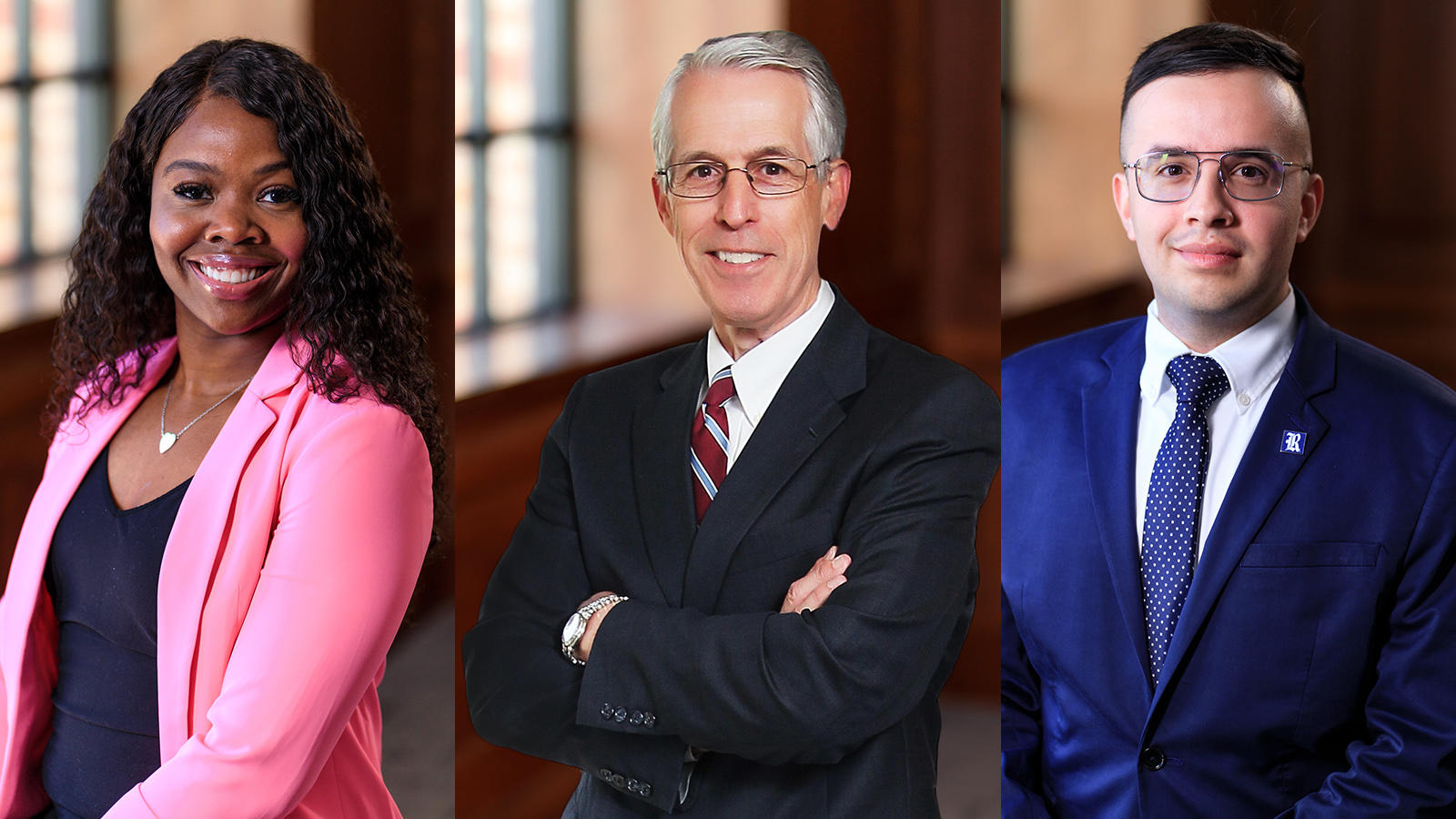
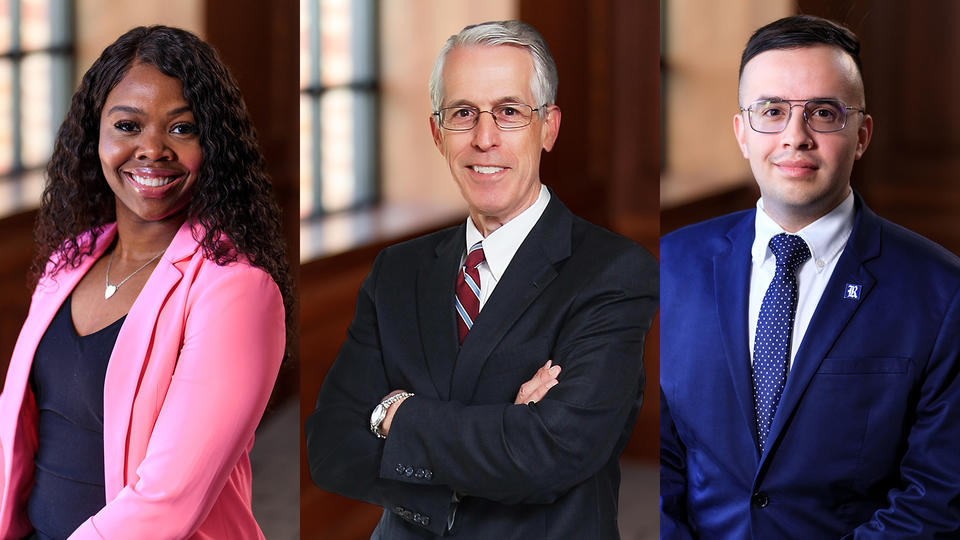
Meet MBA@Rice students, Chinenye Ozougwu and Liam Morris, and recent graduate, Rodney Kroll. This year, the MBA@Rice program is celebrating its 5th anniversary since its establishment in 2018. In 2023, the online MBA program was ranked #4 and #12 on the lists of best online MBA programs by the Princeton Review and U.S. News & World Report, respectively.
What is your current role?
Chinenye: I am the owner and CEO of El Shaddai Care Services (ESCS), Inc.
Rodney: I am the market president for First State Bank in Waco, Texas. In addition, I own an independent insurance agency offering property and casualty insurance for homes, ranches, and vehicles. I recently accepted a part-time role teaching corporate finance at Baylor University.
Liam: I am an assistant airport operation manager for United Airlines.
Why are you pursuing your MBA?
Liam: I didn’t plan on grad school. But about two weeks after completing my bachelor's degree, I was invited to a company event where I met several executives and senior leaders. On the plane ride home, I opened LinkedIn and realized that these executive and senior leaders all had something in common: They had an MBA. I immediately began looking into MBA programs and realized that the degree would not only help me professionally but would also give me an innovative approach to problem-solving.
What prompted your decision to choose Rice Business?
Chinenye: Several factors influenced my decision. One significant factor was the success of my brother who graduated from Rice with a degree in economics. He excelled in college football and went on to the NFL, where he achieved many things, both on and off the field. Additionally, I wanted a local educational experience that would allow me to immerse myself in a vibrant and close-knit student community. Being awarded the Dean’s Scholarship reinforced my decision to join Rice Business.
What has been your favorite memory at Rice Business?
Rodney: I have many great memories about my cohort, the team projects, and the learning experience. I particularly appreciate the faculty members who took time to give me encouragement.
What advice would you give to a prospective student?
Chinenye: Prioritize meaningful relationships and connections over grades and future job prospects. Remember: “Your network is your net worth.” Your network holds immense value and can significantly impact your success in the future. While it’s excellent to maintain a stellar academic record, don't overlook the true essence of the Rice MBA experience. It encompasses much more than you think.
Rodney: MBA@Rice is a great program for someone with an undergraduate degree and a first career job who is seeking to be positioned for career advancement. The program is worth the time and effort to improve your future.
Liam: Don’t be afraid! There have been dozens of times when I asked myself “can I really do this?” My work schedule is totally different from most of my peers. I work nights with weekdays off. I often wondered if this schedule would hurt me, but it did not. Everything will work out if you come to class, complete your assignments, give it your best, and contribute. You’ll walk away with an experience that you can apply daily. Also, bring what you learn to your daily work life. The case studies and lectures I get from school have made an impact on my contribution to work meetings.
Interested in Rice Business?
You May Also Like
How Colleges Plan to Factor In Race Without Asking About Race
Rice University is among the schools that say they are tweaking their essay questions or adding new ones in light of the recent Supreme Court ruling.
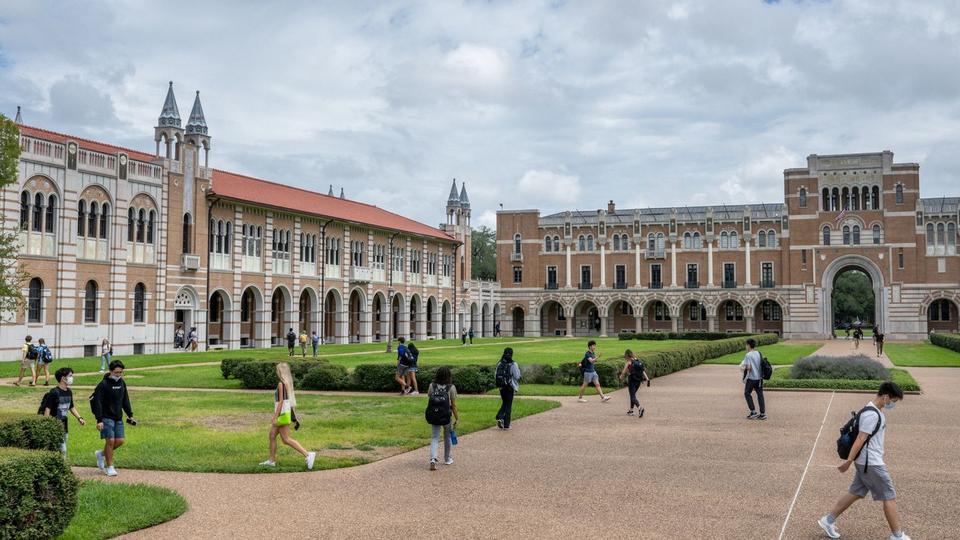
This Is What It Costs To Get An MBA From A Top Business School
Poets & Quants ranked the most expensive MBA from leading business schools in the United States and Europe. Although Rice Business is mentioned, we didn't rank in the top 25 in terms of expense.
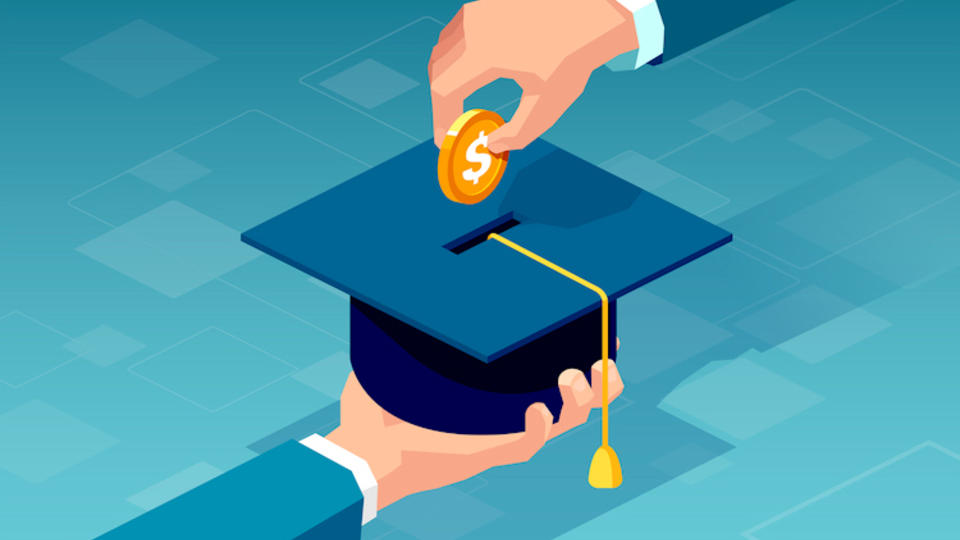
How Does The Fed Make Their Predictions?
Bellwether companies play a surprising role.
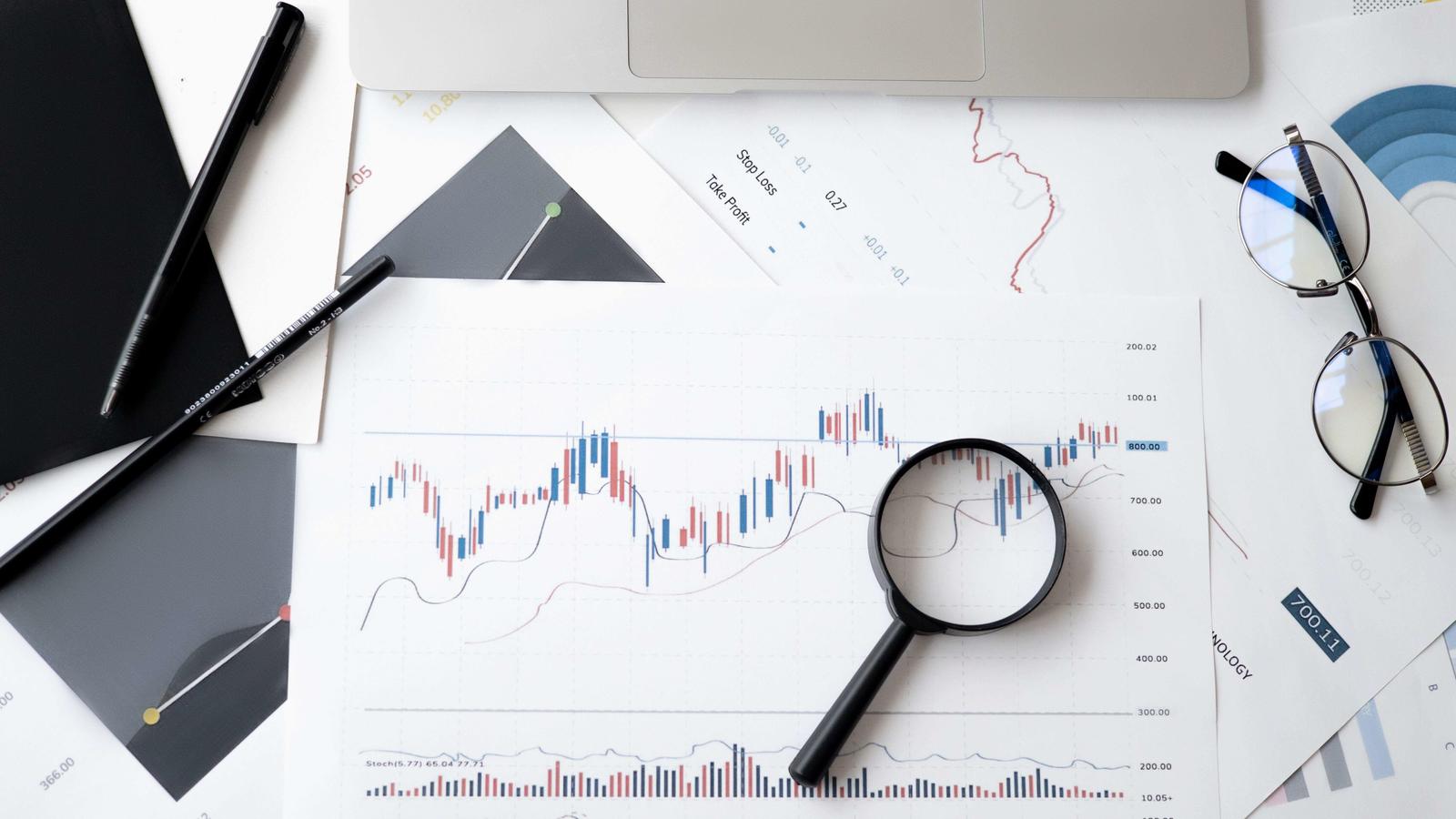
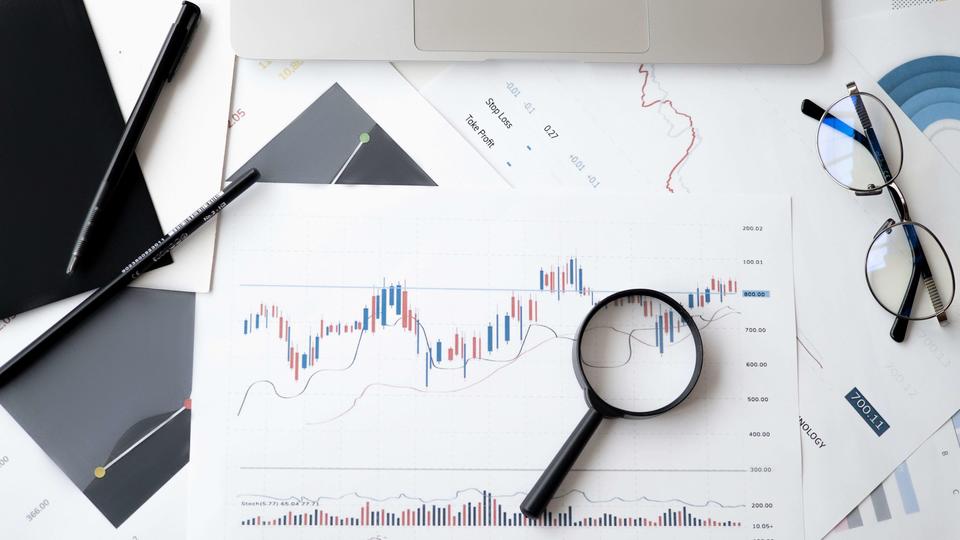
Based on research by K. Ramesh (Rice Business), Edward X. Li (Baruch), Gary Lind (Pittsburgh), and Min Shen (George Mason).
Key findings:
- The Federal Reserve Board uses reams of hard economic data to forecast economic growth and make monetary policy decisions such as setting interest rates and bank reserve requirements.
- The Federal Reserve Board also collects softer qualitative information, like the opinions of business executives who lead so-called bellwether firms whose earnings seem to predict larger trends and play an outsized role in the economy.
- Yet the precise sources of that qualitative information, and how the Fed uses it, have long been shrouded in mystery.
According to research by Rice Business Professor K. Ramesh, the Fed appears to harvest qualitative information from the accounting disclosures that all public companies must file with the Securities and Exchange Commission (SEC).
These SEC filings are typically used by creditors, investors and others to make firm-level investing and financing decisions; and while they include business leaders’ sense of economic trends, they are never intended to guide macro-level policy decisions.
But in a recent paper, Ramesh and his colleagues provide persuasive evidence that the Fed nonetheless uses the qualitative information in SEC filings to help forecast the growth of macroeconomic variables like GDP and unemployment.
According to Ramesh, the study was made possible thanks to a decision the SEC made several years ago. The commission stores the reports submitted by public companies in an online database called EDGAR and records the IP address of any party that accesses them. More than a decade ago, the SEC began making partially anonymized forms of those IP addresses available to the public. But researchers eventually figured out how to deanonymize the addresses, which is precisely what Ramesh and his colleagues did in this study.
“We were able to reverse engineer and identify those IP addresses that belonged to Federal Reserve staff,” Ramesh says.
The team ultimately assembled a data set containing more than 169,000 filings accessed by Fed staff between 2005 and 2015. They quickly realized that the Fed was interested only in filings submitted by a select group of industry leaders and financial institutions.
But if Ramesh and his colleagues now had a better idea of precisely which bellwether firms the Fed focused on, they still had no way of knowing exactly what Fed staffers had gleaned from the material they accessed. So the team decided to employ a measure called "tone" that captures the overall sentiment of a piece of text – whether positive, negative, or neutral.
Building on previous research that had identified a set of words with negatively toned financial reports, Ramesh and his colleagues examined the tone of all the SEC filings accessed by Fed staff between one meeting of the Federal Open Markets Committee (FOMC) and the next. The FOMC sets interest rates and guides monetary policy, and its meetings provide an opportunity for Fed officials to discuss growth forecasts and announce policy decisions.
The researchers then examined the Fed's growth forecasts to see if there was a relationship between the tone of the documents that Fed staff examined in the period between FOMC meetings and the forecasts they produced in advance of those meetings.
The team found close correlations between the tone of the reports accessed by the Fed and the agency’s forecasts of GDP, unemployment, housing starts and industrial production. The more negative the filings accessed prior to an FOMC meeting, for example, the gloomier the GDP forecast; the more positive the filings, the brighter the unemployment forecast.
Ramesh and his colleagues also compared the Fed's forecasts with those of the Society of Professional Forecasters (SPF), whose members span academia and industry. Intriguingly, the researchers found that while the errors in the SPF's forecasts could be attributed to the absence of the tonal information culled from the SEC filings, the errors in the Fed’s forecasts could not. This suggests both that the Fed was collecting qualitative information that the SPF was not—and that the agency was making remarkably efficient use of it.
“They weren’t leaving anything on the table,” Ramesh says.
Having solved one mystery, Ramesh would like to focus on another; namely, how does the Fed identify bellwether firms in the first place?
Unfortunately, the SEC no longer makes IP address data publicly available, which means that Ramesh and his colleagues can no longer study which companies the Fed is most interested in.
Nonetheless, Ramesh hopes to use the data they have already collected to build a model that can accurately predict which firms the Fed is most likely to follow. That would allow the team to continue studying the same companies that the Fed does, and, he says, “maybe come up with a way to track those firms in order to understand how the economy is going to move.”
Ramesh, et al. (2023). “Externalities of Accounting Disclosures: Evidence from the Federal Reserve,” The Accounting Review.
Never Miss A Story
You May Also Like
Keep Exploring
Everybody's Got to Eat feat. Turner Hoff ’13
Season 3, Episode 21
Turner Hoff ’13 pivoted from finance and real estate to food technology. He talks about creating a company to solve his frustrations with food delivery, vertical integration and how the food tech space has developed over the years and through the pandemic.

Owl Have You Know
Season 3, Episode 21
Turner Hoff ’13 pivoted his career from finance and real estate to food technology. He and host Maya Pomroy talk about how he created a company to solve his frustrations with food delivery. They also talk about vertical integration and how the food tech space has developed over the years and through the pandemic.
Subscribe to Owl Have You Know on Apple Podcasts, Spotify, Youtube or wherever you find your favorite podcasts.
Episode Transcript
-
[00:00] Intro: Welcome to Owl Have You Know, a podcast from Rice Business. This episode is part of our Pivot Series, where guests share stories of transformation in their lives and careers.
[00:13] Maya: On today's episode of Owl Have You Know, we introduce you to Turner Hoff, who came to Rice Business to sharpen his finance and real estate acumen, but discovered his destiny was something completely different. He shares a story of initially following in his grandfather and father's footsteps, but recognizing his true passion, lay in entrepreneurship. We talk about his pivot from building and flipping homes to being an architect for a food tech startup, disrupting the industry by focusing on sustainability, and offering the billion-dollar market something the others don't.
On today's episode of Owl Have You Know, we have full-time MBA, Turner Hoff, who graduated in 2013. Turner, we're thrilled to have you here today.
[00:59] Turner: It's a pleasure. I appreciate it.
[01:01] Maya: So, you have had quite a pivot from finance and real estate to entrepreneurship, and it's been a really remarkable journey, all the background that I read about you. I actually want to buy all of your products. But let's start from the beginning. So, you came to Rice after graduating from San Diego. You come from a family of finance and real estate folks, and also entrepreneurs and architects. And that's really the background in which you were raised. So, both of your grandfathers were architects, correct?
[01:35] Turner: That's right, yep.
[01:37] Maya: And your dad was in real estate and in finance.
[01:39] Turner: In real estate, he started on the construction side. So, he grew up in Houston as well, went to Texas A&M, studied construction management, was a general contractor for a long time, now working in development as largely a construction consultant on new and existing deals within their portfolio.
[01:59] Maya: And so, that's…where you were trying to follow in your family's footsteps…is that something that you grew up with, you know, you, sort of, felt like that's what I'm going to do when I grow up?
[02:08] Turner: Yeah, absolutely. It's, kind of, funny actually. I grew up idolizing my dad. I mean, still look up to him. He's probably one of my best friends. And because I idolized him as much as I did, I grew up wanting to get into construction. And we've commiserated over him sharing a similar experience where his dad was an architect. He looked up to his dad. He wanted to be an architect. And when he told his dad that, his dad said, "No, no, no, no, you don't want to be an architect, you don't make any money as an architect. Go into construction." And my dad said the same thing to me. I said, "Well, I want to go into construction." He said, "No, no, no, Turner, you don't make any money in construction. You need to go into the finance side of the industry."
And so, that was really the plan, was that I was going to study the finance side of real estate and gain some professional experience in that field, deepen my expertise and understanding, and then, eventually, work with my dad in some capacity. I mean, having grown up around it, it certainly was entrenched in everything that I knew.
[03:09] Maya: And so, you went, you went to San Diego, which, by the way, amazing weather. I don't blame you. I would've wanted to go there, too. And you got a BBA concentrating in finance and real estate. And then, you came back home to Houston and flipped houses with your dad for about two years.
[03:25] Turner: That's right, yeah. So, I graduated in 2009 with a degree in finance in real estate, which, as you all know, 2009 was probably the perfect time to be graduating with that degree.
[03:37] Maya: That time, yeah.
[03:38] Turner: Both finance... Yeah, both finance and real estate were just booming. I took that time as an opportunity to move back to Houston and work with my dad. And we'd put together a little business plan to buy and sell homes in certain pockets in Houston. And so, I did that for a couple of years before applying and attending Rice.
[03:55] Maya: So, I have friends that are in that business as well. And you certainly have to have a vision, right? And then, there's all these shows on HGTV of Flip or Flop and everything else. Was it like that? Or, is that just a ruse?
[04:09] Turner: I mean, it's a lot of effort for the return you get at a very small scale. And I think, at the time, my dad's experience was all in construction and development, too. And he's done residential, commercial, multifamily, but there just wasn't a lot going on. And so, we used this as an opportunity to work together in some capacity. Having grown up with an architect as a father, he was the one with the vision for it. He can walk into a home and just immediately understand what the space needs and what it's going to look like. I don't have that skill set. I need it to be in front of me, and then I can adapt and modify from there. But our skill sets worked nicely together. I had, I had studied finance and real estate in undergrad, and so I had some experience with financial modeling, specifically within real estate.
And we had put together a business plan and strategy and tried to execute on it for a couple of years. And it worked. It was, it was effective. We did well. But it wasn't something either of us wanted to be doing in the long term and we weren't trying to grow a business out of it. It was, I think, just an opportunity to spend some time together and work together. And it was, I mean, it was a lot of fun.
[05:21] Maya: Well, that is special that you got to spend some time with your dad. But you also recognized that there was something more — you were missing something and you needed something more. So, you came to Rice to get this MBA. So, why did you choose Rice? Was it location, or was it something that you grew up knowing about that you always wanted to be a part of? What was really the push to come to Rice?
[05:44] Turner: Yeah. I mean, I think, growing up in Houston, I'm sure a lot of Houstonians can relate. Rice just has an aura about it. It's really well-known in the South, where the joke is the “Ivy League of the South.” And I just grew up having a lot of respect for the university as a whole and as an institution within Houston. And it was actually the only school that I applied to. So, I had effectively all of my eggs in one basket. I think having the ties to Houston and the network and the community, I also, during school, lived with my dad for those two years, and for that reason, were, at least partially, responsible for those being, like, two of the best years of my life.
[06:31] Maya: That's awesome. I bet he would love to hear you say that. That's really special. So, you studied real estate and finance for two years. You got your MBA. And then, you found yourself in Washington, D.C. You took a position with the Carlyle Group to do real estate and finance. Why did you choose D.C.? Or, did D.C. choose you, kind of, like Rice chose you as well?
[06:57] Turner: Yeah, I think more that D.C. chose me. So, when I graduated in 2013, there are clearly defined tracks for those going into investment banking and consulting. And a lot of my classmates had job offers going into the second year. And that just isn't typical within the real estate industry. I think, especially at the graduate level, it tends to be fairly reactive. And so, I was going into second semester of the second year with no job offers. And then, in April or May, I started to get some traction. And then one led to two, and then two led to six. And so, I found myself in this really fortunate position of having a few offers to choose between. And I knew that I didn't want to be in Houston long-term. I like exposing myself to new geographies, new culture, immersing myself in an environment where I don't know anyone. And D.C. checked a lot of those boxes as, of course, Carlyle being perfectly aligned with, at the time, what I thought I wanted to be doing long-term.
[08:01] Maya: Yeah, like, you were in Houston, and then San Diego, and then back to Houston, and then to D.C. So, you've definitely covered quite a bit of ground in the United States. So, while you were at the Carlyle Group, it was a fairly rigorous position. Tell me about what happened to you. Because you met the love of your life, and then made a complete pivot to something completely different. So, tell me about when you met her.
[08:27] Turner: Yeah. So, we met in November of 2013. I moved to D.C. in June — five, six months after moving here. And we just, we got along great from the beginning and had a lot in common, commiserated over food, even though, at least externally, the way that we approach eating would be perceived as completely contradictory. She's been vegan, vegetarian, some combination of the two for 15-plus years at this point. And the terrible joke that we make is that I've been not vegan my whole life. But, we're both active, enjoy being outdoors, care a lot about what it is that we're eating and how it fuels the rest of our life. And so, we ultimately realized that the common ground that we shared, despite having two completely different dietary perspectives, for lack of a better term, that there was actually a lot of commonality between the two.
[09:24] Maya: So, Ariane and you met in November of 2013 and decided that you are going to do this food tech startup called Vegetable and Butcher. And I think that that was around the time that there were quite a few competitors. I remember seeing all of the competitors of the home delivery, fresh meals for busy professionals and for working moms and those types of folks that really despise going to the grocery store and really just don't have the time or the desire to cook but still want fresh, healthy, clean meals. So, tell me about that day that you decided to do that.
[10:05] Turner: I don't know that there was one specific day in particular, but as you alluded to earlier, I was working long hours as is fairly typical in the finance industry, especially when you're younger in your career. She was in school and working two jobs. And so, much of our free time was limited to Sunday. And we would go to the farmer's market. You can't get everything you need at the farmer's market, so you end up going to the grocery store after. And then, the rest of our day was spent effectively meal-prepping for the entire week. And by the time you're done, you look up and it's 7:00 p.m., and we've spent our entire day shopping, cooking, cleaning. And it was just exhausting.
And when I moved to D.C., I was surprised that a concept similar to Snap Kitchen, which is really popular in the South, didn't exist here. They're small retail footprints, about 400 square feet on the low end, maybe 1,000 square feet on the high end. And they sell fully prepared, ready-to-eat meals, that you essentially grocery shop and pick up prepared meals for the week. And there wasn't anything like that here. And we had talked about it but didn't think much of it. I was early in my career and invested in my time at Carlyle. And we really just brushed it off. But I think the pain point continued to grow. And you had mentioned some of the services were becoming really popular at the time. So, meal kit companies were, in particular, becoming popular, the Blue Aprons and HelloFreshes of the world. And we had tried those services and ultimately realized a couple of things. One, they fundamentally solve a different problem. So, they deliver a box of ingredients to you with a recipe card.
[11:47] Maya: You still have to put in all that time to do that.
[11:51] Turner: Exactly.
[11:52] Maya: No, I've ordered from them. I'm like, wait a minute, like, this all looks great, but I don't have the 30 minutes, which is always longer than the 30 minutes, let's be honest. Because I'm not, I just don’t ... I don't know how to cook.
[12:02] Turner: That was our experience, too. And we're certainly not alone in that because we had a number of conversations. So, the pain point, as you mentioned, the recipe card says it takes 30 minutes. Well, maybe for a trained chef. But it took us 60 to 90, and then we're still cleaning.
[12:17] Maya: Yes, the cleaning, the cleaning part, yes. Nobody talks about that in terms of the time that's invested, is the cleaning.
[12:25] Turner: Yeah. And then, we started to feel just wasteful. You're getting shipped a cardboard box once a week. Every ingredient is wrapped individually in plastic or cellophane packaging. And you just start to accumulate waste. And as we experimented with some of these other services, at the time, there were a couple that were doing fully prepared meals delivered, but there really wasn't anything that aligned with our values and how we wanted to be eating and if we were doing it on our own, the types of partners and vendors and purveyors that we would be working with. I think it just got to a point where we, perhaps, naively thought that we could do it better. And the frustration had grown to a point where we just... we wanted to solve our own problem.
[13:14] Maya: So, how did you start?
[13:15] Turner: We talked about it for, probably, a year and a half. In reflecting, it's, kind of interesting. We formed the legal entity for Vegetable and Butcher back in 2014.
[13:27] Maya: But didn't start until 2016, right?
[13:30] Turner: Yeah. So, we spent a couple of years. And our weekends, our little bit of free time, we used to go to the Portrait Gallery, and they've got a little cafe and market, kind of, in the center of the Portrait Gallery. And we would sit in there on the weekends and put thoughts on paper, essentially drafting what would be the equivalent of a business plan. And as we started to connect with friends and mentors and others in the space, we got interests. We weren't really planning to launch the business early on. It was just something we were doing for fun as a way to spend time together. And it started to get traction among folks who do a little bit of angel investing. And it all really, kind of, snowballed from there.
[14:12] Maya: Part of what your model is, is sustainability, better sourcing. You support 30 local farms, use only pasture-raised and grass-fed animal proteins. You do have a vegan and a vegetarian option. So, you have, like, better nutrition. You've got 40-plus super foods. You don't use refined sugar or artificial ingredients, which is, I mean, that's phenomenal. I don't know how you do that. You've got a door-side delivery three times a week and insulated, reusable, cooler bags. It's also compostable, is that correct?
[14:45] Turner: The meal containers are compostable, yeah.
[14:47] Maya: Okay. And I was actually looking at some of the meals, and you've got a mango yogurt bowl with pistachio apricot granola for breakfast. That sounds amazing. Can you tell me about some of the other meals, some of your favorites that you offer?
[15:04] Turner: Sure, yeah. So, we have a menu that rotates weekly. We focus as much as we can on a seasonally inspired menu. So, there are certain dishes that appear at certain times of the year that you won't see again until fall. For example, we've got a butternut squash chili that I'm a huge fan of. It's not going to be on the menu until fall again. But I think it's so hard to pick an individual dish because there's so much variety. A few that come to mind, I'm a big fan of, basically, all of our overnight oats dishes for breakfast. We've got a base overnight oats recipe that we make, and then our culinary team puts a number of spins on that. So, we've got a dark chocolate avocado overnight oats. We've got a tiramisu overnight oats, all inspired by different flavors, using the same base. For lunch, I love most of our salads. We've got a turnip and green grape salad that does an incredible job balancing the bitterness of the greens, with a little bit of sweetness from the grapes. And then, for dinner, we've got a Korean japchae that I'm a big fan of, a coconut curry dal that I really love. I mean, I could go on and on.
[16:12] Maya: No, I think I'm sold. I think, I think I'm sold. Those all sounds remarkably delicious. So, how big is your organization now? So, you started in 2016. You just had your six-year anniversary. So, tell me about how you grew and how you grew efficiently.
[16:29] Turner: Yeah. I mean, I think the efficiency component came from raising very little capital. And it's forced us to be a very resourceful scrappy team. And there are advantages and disadvantages to that. But I think it's put us in a position of strength, ultimately, in the end, because we've had to be exceptionally resourceful to get to where we are today. And it effectively forced Ariane and I to serve in every single function of the company along the way. So, early on, we were making all of our deliveries. We assisted in the kitchen when necessary. We did all of our marketing. I mean, you name it, we touched every aspect of the business. And I think it gave us a more concrete, holistic understanding for the parts of the business that were going to be challenging to grow and scale, and how to be efficient with hiring. Yeah, I mean, it's been, certainly, a wild journey from where we were day one to where we are now. We've got about 70, 75 employees working for us, and another 50 or so contracted employees who handled delivery, largely.
[17:46] Maya: In what areas are you in? I know, obviously, you're in D.C. Are you countrywide, or are you just in specific regions right now?
[17:56] Turner: So, just in specific regions. We had discussed earlier some of the challenges of the meal kit companies, so the HelloFreshes and Blue Aprons of the world. We've tried to be very thoughtful about our supply chain, and are a completely vertically integrated company, which isn't super common in our space, but from our perspective, one of our biggest differentiators. It allows us to deliver a very high-touch customer experience. We own every aspect of the value chain — from ingredient-sourcing through to food prep and production, order fulfillment, and then delivery to our customer. And because we're vertically integrated and hand-deliver product, we, of course, have a smaller geography that we can cover. When we started in 2016, we were serving just two zip codes, and we're now in about 150 in the D.C., Maryland, Virginia area. We're starting to cover pockets of Baltimore and Annapolis, and then all the suburbs surrounding D.C.
[18:58] Maya: The fact that you're vertically integrated, that's interesting, because in business school we're taught, well, that's usually the best way to go, right?
[19:05] Turner: Yeah.
[19:06] Maya: Is to have that vertical integration. An example of what, you know, we learned in school was Zara. I mean, they're vertically integrated. And, well it's, sort of a double-edged sword based on where you are, in terms of your timeline of your business. But to be vertically integrated in something like this is very, very rare. Starbucks isn't even vertically integrated with, you know, when I go through the drive-thru, I get all of their protein and cheese, you know, their fruit and cheese boxes, and everything else. And I think it's the best thing ever. But, you know, I'm fairly sure that that's not a vertical integration. I'm pretty sure that they source from someone else to create that, because they're a coffee company. And also, that relationship that you have with farmers, like you said, touchpoints, that's very unique in this... in any industry, let alone, you know, food tech.
[19:55] Turner: Yeah. And, as you mentioned, there are advantages and disadvantages to it. From a business perspective, the advantage is certainly that owning every aspect of the value chain does allow you, as a business, to capture margin at each step in the value chain. But I think, more importantly for us, it allows us to own and control the product and customer experience in a way that can't be done if any aspect of the supply chain is outsourced, whether it's the delivery and shipping through UPS or FedEx or outsourcing the production of the product or outsourcing the hand delivery last-mile distribution. It just gives us more oversight and control of the customer experience. And we are of the perspective that, in this market, it's not about being first to market, but about getting the product and experience right, which is why we've placed such a heavy emphasis on it.
[20:54] Maya: Not first, but maybe best — best in market.
[20:57] Turner: Exactly. Yeah, that's what we're striving for.
[21:01] Maya: So, how would you say that the food tech space has been developing over the years? And where do you see the future of it?
[21:08] Turner: Yeah. I mean, things have changed a lot over the past couple of years.
[21:13] Maya: Especially with the pandemic, and I'd like for you to talk about that and about the impacts of that, as well.
[21:18] Turner: Yeah, absolutely. I think, as a whole, the food industry has really lagged other industries in terms of e-commerce adoption. So, if you think about furniture, electronics, books, fashion, it's quite common to purchase those products online in the U.S., so the e-commerce adoption rates across those industries are north of 25, 30, sometimes 50% of the sales are purchased online. In the food space, it's the opposite. I think, prior to the pandemic, it was e-commerce adoption was probably around 5%. Yet, it's the largest area of consumer spending in the U.S. There's been a trend of more and more consumers purchasing food and beverage products online, but the pandemic certainly helped catalyze or accelerate that trend.
[22:11] Maya: For sure. I mean, you know, people started using Instacart more, you know, all of those different businesses that really provided convenience and safety, where they would just, you know, you can, you can get on Instacart and get all your Topo Chico delivered right by your door.
[22:26] Turner: Mhmm.
[22:26] Maya: So, you know, from working with your dad and flipping homes in Houston post-undergrad, and co-founding Vegetable and Butcher with your girlfriend, it seems like you value having your career tied to people that you have close relationships and that you trust. Is that something that has... You know, is that the way that you grew up? And is that something that you see as a necessity for you?
[22:49] Turner: 1,000%. I would probably describe it as like finding my kind of human, like, the types of people that I want to be around. And I'd found that, even prior to starting V and B, knowing that we were going to start the company, I joined a local organization called Netcito. I've become really close with the founder of that company. He calls it peer-based advisory for entrepreneurs and founders. And I would probably describe it as therapy for business owners. But I immersed myself in that community prior to starting V and B. And it really just allowed me to recognize that these are the types of people that I'm meant to be around.
And nothing against my prior experience. I loved my work at Carlyle, and I was just in constant awe of the people I was working with because they're so exceptionally sharp. And I think they're the best at what they do. But when I, when I found myself getting more and more immersed in the entrepreneurial community in D.C., it was just a greater realization that, like, this is where I was meant to be.
[24:00] Maya: Even though you didn't study entrepreneurship at Rice, which is one of the number one entrepreneurship programs in the country.
[24:07] Turner: I did not, no. And yeah, one of, one of my regrets, for sure, in hindsight. I tend to not have much of a throttle. It's more of an on or off switch with me. And so, when I, when I decided on finance and real estate, I was all in and focused intently on that, for better or for worse. But yeah, that tends to be my pattern of behavior there.
[24:33] Maya: Well, you never know. I mean, I think that with the Lilie Lab at Rice, which is their entrepreneurship arm and program, I think that they would love to have you come back to Rice, and you can tell your story to budding entrepreneurs that are at Rice.
[24:47] Turner: Yeah. I was actually in Houston not too long ago, and I did make my way to campus and connected with the folks at Lilie Lab. I love what they're doing with that program there, and it's exciting to see that the undergrad program is getting involved and has access to Lilie Lab. And it's very cool what they're building there. So, any chance I can get to be a part of it, I'd love to.
[25:09] Maya: So, for someone that is starting, or even just studying entrepreneurship, and is thinking, you know, kind of, maybe dipping their toe into it, what kind of advice could you give them?
[25:22] Turner: I generally try to do my best not to give advice.
[25:27] Maya: Sorry, I'm going to make you. I'm putting you on the spot.
[25:31] Turner: But I would say, if you have some idea for the industry you want to be involved in, to do everything you can to immerse yourself in that community. I've found that people are generally open to and genuinely enjoy being helpful to others. I mean, I certainly feel that way. And so, just finding opportunities to connect and immerse yourself in a particular community is, probably, the first thing I would say. Rice and the business school, they do a great job teaching you what it means to network and different ways to go about it. At the end of the day, it's really just about, how can you be helpful to others? And the rest, kind of, falls into place if you approach relationships from that perspective. And so, yeah, I mean, immersing yourself in the community and just finding ways to be helpful to others. It often starts as a side hustle when you're working a full-time job. So, if you've got the passion and grit to be working on a side hustle, then I would say the same probably applies to connecting with others in the space.
[26:38] Maya: And patience, right?
[26:40] Turner: Yeah. In my experience with V and B, everything takes twice as long and costs twice as much. So, yeah, patience is a big one.
[26:50] Maya: Well, as soon as you come to Texas, will you please let us know?
[26:53] Turner: Absolutely.
[26:53] Maya: Because I think you're going to have a lot of really, really loyal customers, like, right here, I'm definitely going to be one of them.
[27:02] Turner: We'll just put the kitchen next to Rice University.
[27:04] Maya: I mean, I think that's a great idea. I think we can work out the real estate. I mean, we've got a bunch of really brilliant minds over there that we can make that happen. But there's definitely a need throughout — not just the country, but the world — to have sustainable, healthy, clean food, you know. I mean, this is, this is something that is the bare bones of society.
[27:25] Turner: Everybody's got to eat.
[27:28] Maya: Everybody's got to eat. I think that's a great way to end. Listen, Turner, this has been a wonderful, wonderful conversation with you. Thank you so much for joining us on Owl Have You Know. And we definitely want to stay in touch and keep track of V and B and watch you grow.
[27:43] Turner: I appreciate it. Yeah, it was a pleasure to connect.
[27:49] Outro: Thanks for listening. This has been Owl Have You Know, a production of Rice Business. You can find more information about our guests, hosts, and announcements on our website, business.rice.edu. Please subscribe and leave a rating wherever you find your favorite podcasts. We'd love to hear what you think. The hosts of Owl Have You Know are myself, Maya Pomroy, and Scott Gale.
You May Also Like
Twitter vs. Threads: Houston social media pros weigh in on how the apps compare
If you've scrolled Instagram in the past week, you've probably seen notices that some of your friends have joined Threads, the social media-verse's buzziest new hangout spot. Chris Ferris, Rice Business alum and vice president of digital strategy at Pierpont Communications, weighs in.
